racial justice
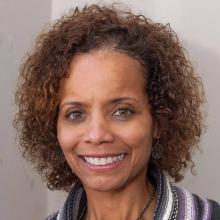
Young people ignited by injustice, refusing to back down. A nation waking up to the reality of racial disparities. And a church that can no longer remain silent. This, says Eden Theological Seminary professor Leah Francis Gunning, is the real “Ferguson Effect.” As she protested in Ferguson over the past year, Gunning collected interviews from clergy and young organizers. The result is Ferguson and Faith: Sparking Leadership & Awakening Community (Chalice Press, 2015), a behind-the-scenes look at the role of the church in the Black Lives Matter movement. Sojourners interviewed Francis to learn more about the religious community’s role in supporting and sustaining a racial justice movement started by young activists.
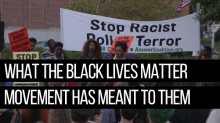
Sunday marked the 1-year anniversary of the killing of Michael Brown in Ferguson, Mo. Both in Ferguson, and across the country, the memorials and marches were held to remember those lost to police violence. Here in Washington, D.C., we attended one such demonstration and asked protesters what the #BlackLivesMatter movement has meant to them over the past year.
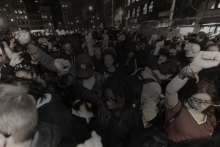
AUG. 9, 2014, is a day I’ll never forget. It was the day that Michael Brown was killed by Ferguson, Mo. police officer Darren Wilson.
For many young people in the United States, especially those of us involved in the Black Lives Matter movement, this was our Sept. 11. We all remember exactly where we were and what we were doing when the news broke of another police-involved killing of an unarmed black citizen.
I was in the final days of a yearlong internship with Sojourners. My fellow interns and I were on our closing retreat in West Virginia. I was on my phone checking my Twitter timeline when I began to see retweets of images: Michael Brown laid out on Canfield Drive with blood still leaking from his bullet wounds. I remember the anger that instantly came over me. “Not another one!” was all I could think.
As the day wore on, I felt frustrated that I was stuck in a retreat house, forced to sit idly by while the grieving community in Ferguson was antagonized by officers in riot gear with police dogs. I knew then that I had to do whatever it would take to join the people in this fight for justice. I never imagined how this movement would change the way I—and many others—actually do theology.
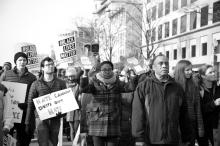
In the wake of Sandra Bland’s death, I’ve seen comments from other white Christians on social media defending the arresting officer, denying that Sandra Bland was mistreated, blaming her for what happened, and denying that race had anything to do with what happened to her. Their responses were so knee-jerk automatic that I probably could have written them ahead of time before learning anything specific about the events in question. We humans can be quite tribal, and we instinctively tend to identify with the people who are most like us.
Many whites balk at the suggestion that their views and assumptions might be racist because they know themselves to be moral people who live decent lives and maybe even have some black friends. They certainly don’t hate anybody, and they aren’t supporters of the Ku Klux Klan. Because they understand racism on an individual rather than systemic level, it seems impossible to hold together an image of oneself that contains both “good person” and “racist.”
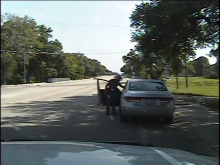
Once again we find white people blaming a black victim of violence. She’s to blame because she was “irritated.” She’s to blame because she refused to put out her cigarette. She’s to blame because she’s black.
A white response that blames Sandra Bland is a racist response. White people can get away with being irritated at police. We don’t have to be kind to officers. We can express our anger and not fear arrest.
A black person though? If a black person shows any anger, they will likely be arrested or possibly killed. And it will be construed as their fault.

The work we do in the nonprofit sector is complex and multifaceted. Often we find ourselves compartmentalizing our identities based on the work we’re currently doing. Am I a woman, an organizer, an African American, a facilitator, a Roman Catholic, a philanthropist, or a manager? And which of those is most important to the success of my work?
The Summit, hosted by Sojourners, is a unique opportunity to rise above some of these identity markers and practice being as holistically authentic as we can. Over 300 leaders committed to changing the world through faith and justice gathered in June in Washington, D.C., for a three-and-a-half day exploration of the particular ways that faith leaders impact a range of social justice issues. NCRP facilitated a private conversation for nearly 2 dozen philanthropic leaders who attended The Summit to consider the role that philanthropy plays in this process.

I was raised in Atlanta during the heyday of the civil rights era. I went to high school with some of Martin Luther King, Jr.’s children. And I didn’t know there was a racial problem in my city. Because for me and my people there wasn’t. It was somebody else’s problem. Across town. Somewhere else.
The black maids and gardeners rode a tidal wave into my white neighborhood each morning, tended babies, fried chicken, and manicured lawns. And then the tide washed them back out again. We didn’t often ask where they landed for the night and whether it was as sumptuous as our digs, or whether their neighborhoods were even safe. We just dropped our bath towels on the floor and figured that somebody would pick them up again in the morning. Life was good.
From the remove of 40 years and 600 miles, I see it differently. But it took more than time and distance to reckon with my own cluelessness about race. It took what it always takes for barriers to fall between “us” and “them” — getting to know some of “them.” I’ve gotten as far as being able to name that I am on one side of many different divides, including the dinner counter at the Mission, and I’m usually on the less-shitty side. And it’s through no merit of my own. In fact it’s where people like me, white and privileged, have long been and have little questioned.
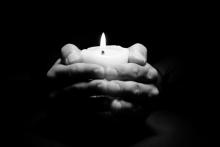
We are brokenhearted by the murders of nine parishioners at the Emanuel African Methodist Episcopal Church in Charleston, S.C. We join our brothers and sisters in deep lament for the lives lost in this evil act, and our prayers go out to all of the victims, their families and their communities.
Atrocities like this wound the very soul of our nation. We must not merely attribute this horror to the depraved actions of one individual, mourn those we have lost, and move on as if there is nothing more to do. In his statement yesterday, President Obama quoted Dr. Martin Luther King, Jr.'s words in the wake of the bombing of a black church in Birmingham, Alabama in which four little girls were killed:
"...We must be concerned not merely with who murdered [these girls], but about the system, the way of life, the philosophy which produced the murderers. Their death says to us that we must work passionately and unrelentingly for the realization of the American Dream."
The deep wounds of racism, America's original sin, still linger in our society, our institutions, and in our minds and hearts — sometimes explicitly, but far more pervasively through unconscious bias. Wednesday's terrorist act is the latest manifestation of this lingering sin. Are there no safe places for black people in our country, even the places where they come together to worship?
We all have the responsibility to overcome both the attitudes and the structures of racism in America. Today we mourn, but tomorrow we must act.

It was a devastating weekend for black people in America.
On Friday, a white police officer pulled his gun at a pool party and assaulted a 15-year old black girl who cried for her mom in McKinney, Texas. On Saturday, a young black man committed suicide in his parents’ home in the Bronx after being held without trial at Rikers Island for three years (nearly two in solitary confinement), accused of stealing a backpack — a charge that prosecutors ultimately dropped. On Sunday evening, hotel security officers profiled four young black organizers from Baltimore in the lobby of the Congress Plaza Hotel at the conclusion of The Justice Conference.

After a video of white police officers arresting black teenagers with excessive force went viral over the weekend, the police department in McKinney, Texas, has opened a formal investigation into the incident, placing one officer on administrative leave.
The officers were responding to residents who complained about unwelcome teenagers causing a disturbance at a private community pool in the affluent Craig Ranch subdivision of McKinney, Texas.
In the video, Police Corporal Eric Casebolt is seen pushing a bikini-clad 14-year-old girl to the ground, before jamming her face down and sitting on top of her. When two boys jump up to confront the officer, he pulls out his firearm and points it at the teens.
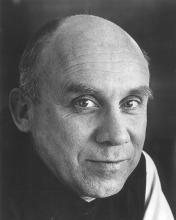
If the influential Catholic writer Thomas Merton were alive today, he would likely have strong words about police brutality and racial profiling.
Back in 1963, Merton called the civil rights movement “the most providential hour, the kairos not merely of the Negro, but of the white man.”
His words echoed May 16 among black pastors at a conference, titled Sacred Journeys and the Legacy of Thomas Merton, hosted by Louisville’s Center for Interfaith Relations. The event marked the 100th anniversary of Merton’s birth.
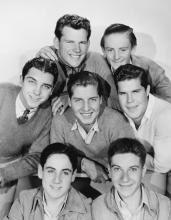
White privilege manifests at college fraternities
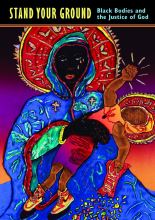
Douglas writes in response to the murder of Trayvon Martin, tracing the intellectual and cultural genealogy of a “stand your ground” culture — one that polices our public ‘white’ spaces, and kills men and women of color who are in them. Sadly, as the deaths of Michael Brown and Freddie Gray show, our cops and our culture are still killing innocent people of color. We aren’t a post-racial culture at all.
Stand Your Ground takes a cruciform shape: we face the death of the cross in her depiction of the despair of a culture that kills its citizens, before rising in the resurrection hope of a black faith.
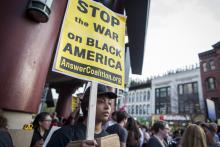
Baltimore, like Ferguson, is a parable — a story that can teach us important lessons. It's one in which we should see that we are, for the most part, still missing the most important lessons.
Decades of bad behavior on the part of Baltimore's police force in relation to the black community were brought to light, as in other circumstances of young black men dying at the hands of police. But the parable of Baltimore needs to go deeper.

Ultimately, Jesus shows us that our wounds do more than mark us — they connect us. Jesus knows that through the touching of his wounds, Thomas will be forever connected to him, doubts and all. Jesus knows that we must let our scars speak. In this beautiful, intimate encounter with Thomas, Jesus teaches us to let our wounds show and be touched so we too can know peace. Peace cannot come to us until we have the courage to proudly bare our scars and connect with one another through our wounds. Until then, we, like Thomas, will be left standing in our doubts and anxieties.
I will not pretend to fully understand the complex circumstances surrounding the death of Freddie Gray and the riots in Baltimore. But I have to wonder what would happen if we followed Jesus’ instructions to Thomas. What if instead of ignoring bystanders’ cries for Freddie Gray to receive medical treatment, the police had reached out their hands and held an inhaler for Freddie Gray? What if all the people of Baltimore had put their hands on Freddie Gray’s injured spine? What if the police force in Baltimore had reached out for the wounds of grief deeply gnawing within the rioting crowds? What if the crowds had placed their hands into the wounds of the injured police officers?

For being a television show based on absurdist humor and millennial first-world-problems, New Girl hit home earlier this month.
Winston, played by Lamorne Morris, is a roommate with a thousand changes in career, the latest and most lasting being that of a cop for the Los Angeles Police Department. The hilarity surrounding Winston has mostly been about his police training or his friend’s concern for his safety, when they tried to physically keep him from policing by stealing his cruiser keys. Then, with script writing help from Morris himself, New Girl took a momentarily serious turn.
When a pretty woman invites Winston on a date to the park for a rally to protest the police, who she describes arrested a 14-year-old because he “fit a description,” Winston declines, walking backward to hide his LAPD shirt.
He later says, “With everything that’s been going on, I just feel like she wouldn’t respect me.”
In that moment, Morris’ character finds himself caught between two conflicting worlds, what W.E.B. Du Bois called having a “double consciousness” — the brotherhood of a police force alongside white officers, keeping the peace and making neighborhoods safer; and the collective turmoil that comes with being a black man in a post-Ferguson America.
Many Americans must feel this conflicting pull and feel unable to voice it: citizens with friends or family who are officers and who are in solidarity with their black and brown neighbors; officers themselves who fear for their safety every moment they are on duty and battle with racial implicit bias because of harrowing experiences in their communities.
I myself feel this pull as a woman of color who grew up in North Philadelphia, where a mistrust of police was built into my framework of survival despite never once having a negative experience with Philly police. Solidarity with Eric Garner, John Crawford, and Dante Parker is a given. They are the kind of men I saw everyday growing up, men with questionable pasts and an unquestionable love for their families and communities — despite only the former being brought to light.
And I have met police officers working in neighborhoods where they and their partners are cornered and ambushed by street gangs; men and women with families, who are told they are hated by the black and brown children they rescue from crime scenes.
I turned to music as I wrote myself in circles, trying here to verbalize an emotion, a worried feeling that I’m not doing something right. I came across a radio interview with Community star and rapper Donald Glover in which he talks about what I believe Morris was battling with his New Girl script.
“Being young and black in America is schizophrenic. You kind of have to change who you are a little bit all the time for people to even respect you.”

Years ago as a child growing up in Cleveland, Ohio, I was befriended by a wonderful family around the corner from my home. The patriarch of the family, Edward Blunt Sr., was a hard-working executive for a telecommunication company; the matriarch, Roma Blunt, lovingly called Aunt Roma, was a consultant for several local educational institutions; and their son, Ed Jr., became one of my best friends and adopted brother.
Ed and I played sports, shared the same birthday, and graduated from high school and college together. Ed's family provided a unique gift for the young men in our neighborhood. As a result of their southern roots and deep-rooted village values, they believed adults — especially adults of African descent — had a responsibility to aid and assist in the development of young men in the community.
At least weekly, a gang of musty, sweaty, boisterous young men crowded into the Blunt household to take part in a ritual of culinary excellence provided by Aunt Roma. In this house we did not own, pay for, or live in, we witnessed the southern artistry and gastric creativity produced with a palette of collard greens, gumbo, cornbread, sweet potatoes, macaroni and cheese, fried okra, and fish on the canvas of our senses. The white house on Green Road became our hangout, respite, and my second home. Since I lived geographically closest to the Blunts’ home, I found myself at their address more frequently than other "brothers" in our network.
Upon one of my routine visits after finishing another amazing meal, Aunt Roma passed on a special gift. She handed me a key to the home. She stated with matter-of-fact ease, "Otis, you're over here enough, you might as well have a key."
After I said thank you, she began to reemphasize the rules of the house.
"You are always welcome here … you are welcome to eat, rest, and relax ... I trust you, and as long as you abide by the rules of the house and your parents are aware of where you are, this door is always open to you."
I was given access to the Blunts’ home because of my relationship with their son. I was given access to a home I did not create, build, or purchase. Because of my relationship with their son, I was given access to an environment I did not create.
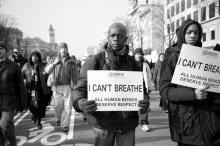
In “A Newsfeed of Fear” (Sojourners, May 2015), Gareth Higgins argues that our newsfeeds often scare us into believing the world is getting worse when the world is actually getting better.
Although I resonate with a call for calm in an age of violent clickbait, we cannot discuss “A Newsfeed of Fear” without talking about race in post-Ferguson America. When we say our newsfeeds are filled with fear, we need to think more about which newsfeeds are making us afraid and whose fear we’re discussing.
For example, when Higgins bemoans “horrifying, brutal videos, edited for maximum sinister impact,” perhaps a reference to the all-too-familiar videos of ISIS hostages, I actually envision Walter Scott and Eric Garner and Tamir Rice and all the others. While the videos produced by ISIS are fearmongering propaganda intended to provoke, we wouldn’t want to call newsfeeds unmasking the reality of police brutality a corrupting influence on our society, right?
And in this context Higgins’ claim that the world is actually getting better is especially dangerous. Advising police brutality whistle blowers to keep their violent videos to themselves because they paint “too cynical a portrait of the improved race-relations in our society” would border on the insane.
The problem with media is not so much that it makes us fearful, but that it makes certain people fear certainthings and certain other kinds of people. It makes my mom fear that her granddaughters will get kidnapped in a very safe neighborhood. It makes me, a white guy, fear walking past black men in hoodies at night, and not white guys in polos. What you fear depends on where you’re standing and what you’re watching.
From where Higgins is standing, “our culture has been hoodwinked by the idea that we’re living in the center of crisis, when actually we’re in the midst of the evolution of hope.” In his eyes, our culture cultivates a false sense of constant terror.
But we need to ask: whose culture? When I read #BlackLivesMatter activists, they seem to say: “no, most people have been hoodwinked by the idea that ‘our’ (meaning American) culture is living in the midst of the evolution of hope, when actually ‘a certain (black) culture’ is indeed in the center of crisis.” So who’s right about the value of violent, fearful newsfeeds?
It depends on where you’re standing and what you’re watching.

We want to extend our sincere gratitude to all who signed the Open Letter to Franklin Graham in response to Graham’s original Facebook post on March 7. One month later, the open letter’s original team of writers, along with the Sojourners community, has been deeply encouraged by the broad support the letter has garnered. Thousands of faith leaders across the country have signed the letter with more joining in solidarity every day.
We thought you might be encouraged to see this updated list of principal signatories who have joined their voices to the thousands calling for repentance and reconciliation. Stay tuned for more ways to stay engaged in this conversation.
If you haven’t signed the letter yet, it’s not too late. Click here to sign the Open Letter to Franklin Graham.
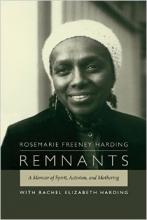
Rosemarie Freeney Harding describes the reaction of her friend—Albany, Georgia-based civil rights leader Marion King—to a physical attack.
In the summer of 1962, in the middle of the Albany campaign, Marion and I were both pregnant. During the campaign, Marion often visited movement workers who were jailed in local facilities throughout Dougherty and Terrell counties—taking them food, checking on conditions where they were kept, relaying messages. On one occasion as she exited a jail, a policeman who felt she was not moving fast enough kicked her in the back so that she fell to the ground. Marion fell so hard that she lost the baby.